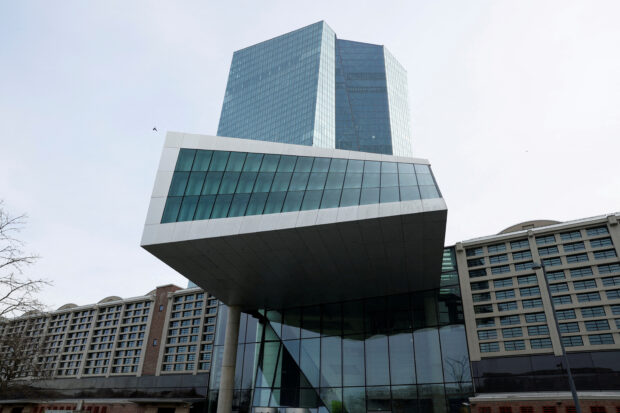ECB to cut rates in Q2, earlier than thought – Reuters poll

A view of the European Central Bank (ECB) headquarters in Frankfurt, Germany March 16, 2023. REUTERS/Heiko Becker/File photo
BENGALURU – The European Central Bank will cut interest rates in the second quarter of next year, earlier than previously thought, according to a slim majority of economists in a Reuters poll, as the economy enters a short and shallow winter recession.
After inflation fell to 2.4 percent last month, ECB hawk Isabel Schnabel told Reuters on Tuesday the central bank could take further interest rate hikes off the table. All 90 economists in the Dec. 1-6 Reuters poll said the deposit rate would end 2023 at its current record high of 4 percent after the ECB’s final decision of the year on Dec. 14.
Taking recent commentary as a dovish signal, investors are now pricing in around 150 basis points of cuts starting March next year. But the Reuters survey was more in line with the “higher for longer” rates narrative.
Around 57 percent of economists – 51 of 90 – predict at least one rate cut sometime before the ECB Governing Council meets in July.
That was a change from a November poll where around a 55- percent majority expected rates would stay at current levels until mid-2024 at least.
Medians showed a 25 basis point cut in each quarter of next year starting Q2, significantly less than what markets are currently expecting.
“We have penciled in some rate cuts for next year but not as early nor as steep as markets are currently pricing … I’m currently still on September as the base case, but I do see risks that they could go in June or July instead,” said Bas van Geffen, senior macro strategist at Rabobank.
“I think it’s really an inflation story … If the disinflation is a bit quicker, then it could be end of Q2, but I think March is quite a stretch.”
If survey medians are realised, the ECB would begin cutting rates before the U.S. Federal Reserve, which was expected to remain on hold until at least July by a slim majority in a separate Reuters poll. The predicted 75 basis points worth of cuts from the ECB was also less than that expected from the Fed.
Price pressures in the euro zone are currently lower than in the U.S., but cutting before the Fed could weaken the euro and introduce unwanted imported inflation.
Headline inflation was predicted to decline over the coming quarters but still remain above the ECB’s 2 percent target until at least 2025.
On the other hand, economic prospects appear dim. After contracting 0.1 percent last quarter, the 20-country economy was expected to shrink again this quarter by the same magnitude.
Two consecutive quarters of contractions would fulfil the official definition of a recession. Still, this winter recession was expected to be shallow, with the weakest forecast at -0.3 percent, and not deter the central bank from focusing on their inflation mandate.
“The ECB has said in the past it knows its tightening cycle will hit growth. A recession of the magnitude we’re expecting of just 0.1 decline in Q3 and Q4, it’s not going to shake them to the core,” said Melanie Debono, senior Europe economist at Pantheon Macroeconomics.
The economy was expected to exit the recession next quarter by expanding 0.1 percent, making it a short downturn. Growth was expected to average 0.6 percent next year and 1.4 percent in 2025.
“It’s not very impressive, but it’s not zeroes, so at the moment it’s better than what we’re seeing … Nobody will be rejoicing because there’s still plenty of headwinds in front of the economy,” added Debono.